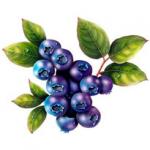
Studies conducted by scientists at the Ohio State University Comprehensive Cancer Center (USA) have shown that daily consumption of a cup of black raspberries (Black Raspberry) or blueberries may protect a person from esophageal and colon cancer. Researchers attribute these results to the high content of potent antioxidants in the berries — anthocyanins, known in the food industry as additive E163.
The results of the studies were published in 2007 in the leading medical journal PubMed Central and on the Ohio State University website. The work was funded by grants from the National Cancer Institute and the Ohio Department of Agriculture.
The research was conducted on two groups of rats. Each group of rats was administered the chemical carcinogen NMBA, which induces esophageal cancer. NMBA belongs to a group of chemicals called nitrosamines — compounds that promote cancer development. Nitrosamines are also found in fried bacon, sausages, tobacco products, and beer.
The rats were divided into several subgroups depending on the dose of black raspberries consumed and whether they were administered simultaneously with the carcinogen. In rats receiving 5% and 10% black raspberries as part of their total food intake, the number of tumors that developed was reduced by 39% and 49%, respectively, compared to animals that did not consume black raspberries. The berries also inhibited the progression of cancerous lesions. By the 25th week of the study, in rats consuming 5% and 10% doses, the number of tumors decreased by 62% and 43%, respectively. By the 35th week, in the 5% diet group, the number of tumors was reduced by 66.5% compared to animals not fed berries. It was observed that initially, daily consumption of berries at 10% of total food intake was more effective, but over time it became clear that the 5% diet produced better results. Professor Stoner explains this paradox as follows: “There are certain compounds in berries and other fruits and vegetables that, in very high doses, may actually promote the cancer process. This, of course, does not mean one should stop eating fruits and vegetables, but also not to overdo it.”
In the current study, Stoner and his colleagues attribute the beneficial effects to the combined action of ellagic acid and anthocyanins — compounds abundant in black raspberries. Scientists know that certain foods contain substances that can protect against specific types of cancer. Previous studies have shown that tomatoes help prevent prostate cancer, and tea consumption reduces the risk of esophageal cancer. However, the exact mechanism of action of these micronutrients is still not fully understood.
Further human studies have also shown the effectiveness of black raspberries in combating cancer. On average, consuming powder made from dried berries reduced the rate of tumor formation by 50%.
Researchers continue to investigate the effects of food on cancer development.
It was also previously reported that anthocyanins are also effective in treating chronic diseases.